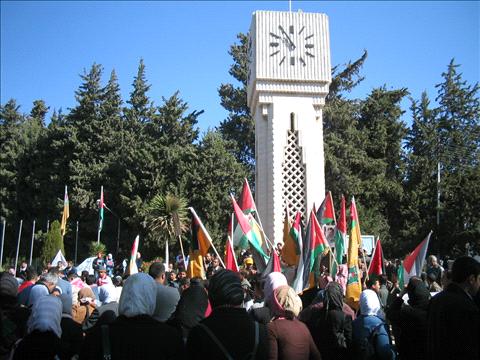Ammon News - AMMONNEWS - (Jordan Times) -
By Thameen Kheetan
January 8, 2009
During last month’s University of Jordan (UJ) student council elections, Majed secretly distributed Jordanian Communist Party pamphlets.
Though a member of a licensed political party, he was forced to work clandestinely as political parties are banned from being active on campuses in Jordan.
The self-proclaimed communist is one of approximately 250 leftists in addition to several-thousand Islamists enrolled in Jordanian universities, according to party leaders’ estimates.
They said the ban on party activity in universities gave leeway for a “tribal mentality” to prevail on the political scene in higher education institutions, adding that the trend has led to a rise in bigotry on tribal and regional bases.
Working in groups under different aliases, such as the "Islamist current", "students for change" and the "national unity", party-affiliated students say they are often subject to interrogation by university officials and security guards on campus.
"Only my close friends know about me being a communist," Majed told The Jordan Times, adding that he and his peers distribute the party's newsletter on campus only to students they “trust”.
Banned by law
Under Article 21G of the 1992 Political Parties Law, political parties are obliged not to “use public institutions or educational institutions for party activities in order to keep them unbiased in carrying out their duties”.
The 2007 Political Parties Law which came into force last year, maintained the principle, grouping universities under the category of “public institutions”.
Officials at the Ministry of Political Development were unavailable for comment.
UJ President Khalid Karaki, who turned down repeated requests for an interview by The Jordan Times, told reporters on student council election day late last year that "political thought is not banned; let anyone rise and say he's an Islamist or a communist… but partisan work is prohibited".
Political analyst and former director of the UJ Centre for Strategic Studies Mustafa Hamarneh attributed the ban on political parties on campuses to historic events leading up to the martial law era, such as the 1950s, when left-wing parties were prevalent on campuses across the Kingdom and were powerful enough to influence public opinion.
"This is unreasonable," he told The Jordan Times, adding that "it is unconstitutional to divide the Kingdom into places where political action is prohibited and others where it is permitted".
UJ professor and former Muta University president Ali Mahaftha said political activity acts as a distraction to the education process, noting that instead of political movements, students should focus on advocating for their rights, cultural activities and voluntary work.
“Political party activity tends to turn universities into a place of struggle and leads to violence between students,” Mahaftha said.
‘Tribalism’ in student
council elections
Al Ghad columnist and political analyst Jamil Nimri said the tribal alignments on campus that have replaced political parties "have no common ground nor ideology".
"Because of the ban, candidates cannot talk to their potential voters freely; therefore, they make use of family relations so that they can get elected," he explained, noting that according to electoral regulations, ticket nomination is not allowed.
Such tribalism has led to a rise in violence between tribal-affiliated groups on campus, remarked Fakher Daas, coordinator of the National Campaign for Defending Students Rights (Thabahtoona).
The campaign condemned inter-tribal violence in several Jordanian universities over the last two months, claiming that such acts were agitated by the one-person, one-vote system in student council elections.
The system, which has been applied in national parliamentary elections since 1993, is a leading cause for the rise of tribalism, according to Hashemite University President Abdul Rahim Hneiti.
"Parliamentary elections focus on serving the tribe and the family, and this experience was transferred to universities," he told The Jordan Times in an interview.
Hneiti said tribalism can be limited through voluntary work and cultural exchange where "a student from Irbid would meet his peer from Salt and they would have the chance to get to know each other".
Political activists
divided over outlook
After eight years of problematic relations with university administrations, Islamist students said they feel more comfortable being active on campuses following the recent student council elections, the first directly elected body in seven years.
Spokesperson of the Islamist current group Abdullah Kilani lauded a "transparent" electoral process, as other Islamists, who had a majority of council seats leading up to 2001, said they were "satisfied" with the 25 seats out of the 83-member council gained late last year.
"We want to participate without eliminating others; we all need to be represented," Islamist student activist Hamdoun Khatib said.
"Restrictions on party activity and student activism have somehow decreased,” he added.
Leftist students however, feel otherwise.
"There is no dialogue, there is only detention," a leftist student activist told The Jordan Times, wishing to remain anonymous.
